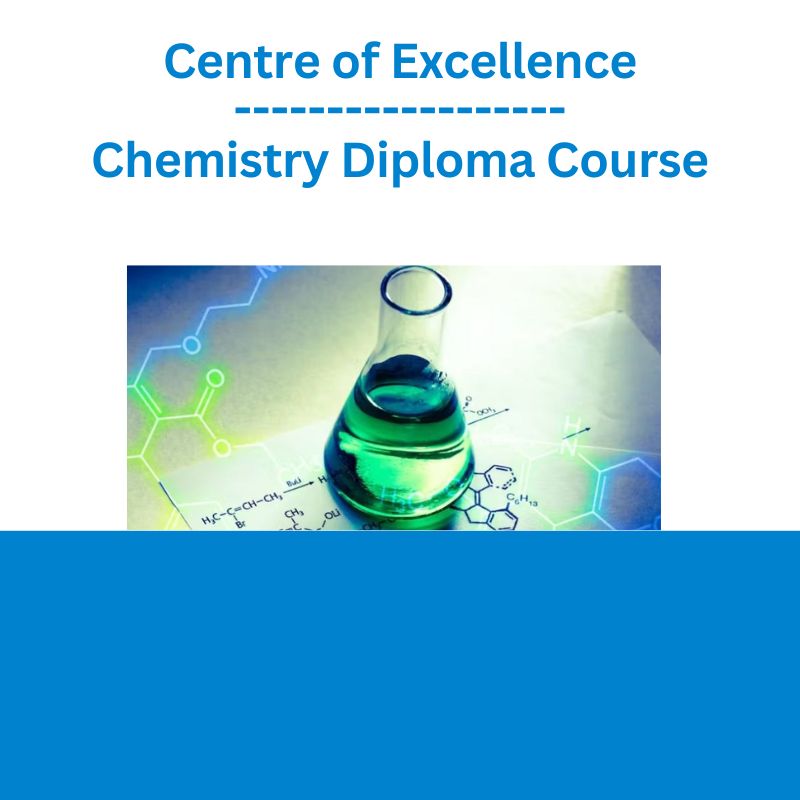*** Proof of Product ***
Exploring the Essential Features of “Centre of Excellence – Chemistry Diploma Course”
What Will You Learn?
Chemistry helps us understand the world around us – our bodies, the air we breathe, the ground on which we stand and so, so much more. Humanity’s knowledge of chemistry helps us to meet our basic needs and develop further technologies to improve our quality of life.
The Chemistry Diploma Course explores the quantitative relationships of atoms and molecules, the structure and properties of atoms, the three states of matters and the interaction between the molecules in each of them, and the types of chemical bondings and their properties.
We’ll look into the entropy and enthalpy change of various chemical reactions, electrical and chemical changes, the equilibrium process and reversible chemical reactions, and the factors that affect the rate of a chemical reaction.
You’ll examine patterns in chemical and physical properties of the elements in the periodic table, take an in-depth look into the trends of the properties and uses of group 2 and group 17 elements, and discover the physical and chemical properties of transition elements, nitrogen and sulphur.
The course explains the naming conventions, organic reaction terminology and structures of organic molecules, the properties and uses of different types of hydrocarbons, and the characteristics and chemical reactions of hydroxyl compounds and halogen derivatives and carboxylic acids, carbonyl compounds and derivatives (acyl chlorides and esters).
By studying this course, you will:
- Further your chemistry knowledge
- Gain a better understanding of atoms, molecules, compounds, and states of matter
- Become familiar with the processes that occur during chemical reactions
- Discover more about elements in the periodic table
Course Syllabus
What will I learn on the course?
Module 1: Atoms, Molecules and Stoichiometry
Introduction
Part 1: Definitions
Part 2: Mole Concept
Part 3: Chemical Equations
Part 4: Units of Concentrations
Test Your Knowledge
Key Learning Points Exercise
Module 1 Assessment
Module 2: Atomic Structure
Part 1: Subatomic Particles
Part 2: Atomic Number and Atomic Mass
Part 3: Isotopes
Part 4: Quantum Numbers
Part 5: Orbital Energy
Part 6: Ionisation Energy
Part 7: Electron Affinity
Test Your Knowledge
Key Learning Points Exercise
Module 2 Assessment
Module 3: Chemical Bonding
Part 1: Types of Chemical Bonding
Part 2: Intermolecular Forces and Bond Polarity
Part 3: Other Parameters of Bonds
Part 4: Intramolecular Forces
Test Your Knowledge
Key Learning Points Exercise
Module 3 Assessment
Module 4: States of Matter
Part 1: Intermolecular Forces
Part 2: Gaseous State
Part 3: Liquid State
Part 4: Solid State
Test Your Knowledge
Key Learning Points Exercise
Module 4 Assessment
Module 5: Chemical Energetics
Part 1: Enthalpy Changes
Part 2: Formation of Ionic Solids
Part 3: Entropy Changes
Part 4: Gibbs Free Energy Change
Test Your Knowledge
Key Learning Points Exercise
Module 5 Assessment
Module 6: Electrochemistry
Part 1: Redox Reactions
Part 2: Electrolysis
Part 3: Redox Reactions and Electrode Potential
Part 4: Nernst Equation
Part 5: Batteries
Test Your Knowledge
Key Learning Points Exercise
Module 6 Assessment
Module 7: Equilibria
Part 1: What is Equilibria?
Part 2: Theories and Concepts
Part 3: Strength of a Base and an Acid
Part 4: Acid-Base Titration
Part 5: Buffer Solutions
Part 6: Solubility Product
Test Your Knowledge
Key Learning Points Exercise
Module 7 Assessment
Module 8: Reaction Kinetics
Part 1: Rate of Chemical Reaction
Part 2: Order of Reaction
Part 3: Half-Life and Molecularity of Reaction
Part 4: Rate of Multi-Step Reactions
Part 5: Catalyst
Test Your Knowledge
Key Learning Points Exercise
Module 8 Assessment
Module 9: The Periodic Table – Chemical Periodicity
Part 1: The Periodic Trend in the Physical Properties
Part 2: Structure and Nature of Period 3 Oxides
Part 3: Periodic Trends in Chemical Properties
Part 4: Interpret the Variations and Trends in Terms of Bonding and Electronegativity
Part 5: The Characteristic Properties of Elements
Test Your Knowledge
Key Learning Points Exercise
Module 9 Assessment
Module 10: Group 2 and Group 17
Part 1: Group 2 Elements
Part 2: Trends Followed by Group 2 Elements in their Physical and Chemical Properties
Part 3: Physical Properties of the Group 17 Elements
Test Your Knowledge
Key Learning Points Exercise
Module 10 Assessment
Module 11: Transition Elements, Nitrogen and Sulphur
Part 1: Transition Elements
Part 2: The Reaction of Transition Elements
Part 3: Colour of Complexes
Part 4: Stereoisomerism
Part 5: Stability of Complex Compounds
Part 6: Nitrogen
Part 7: Sulphur Oxides
Test Your Knowledge
Key Learning Points Exercise
Module 11 Assessment
Module 12: Introduction to Organic Chemistry and Nitrogen Compounds
Part 1: The Formula, Functional Group and Nomenclature
Part 2: Isomers of Organic Compounds
Part 3: Characteristics of Organic Compounds
Part 4: Types of Organic Reactions
Part 5: Shapes of Organic Molecules
Part 6: Geometrical Isomerism in Alkenes
Part 7: Primary Amines
Part 8: Amides
Part 9: Amino Acids
Test Your Knowledge
Key Learning Points Exercise
Module 12 Assessment
Module 13: Hydrocarbons
Part 1: Alkanes
Part 2: Source of Hydrocarbons
Part 3: Alkenes
Part 4: Hydrocarbons as Fuels
Part 5: Arenes
Test Your Knowledge
Key Learning Points Exercise
Module 13 Assessment
Module 14: Halogen Derivatives and Hydroxyl Compounds
Part 1: Nucleophilic Substitution Reactions
Part 2: Alcohols
Part 3: Phenol
Test Your Knowledge
Key Learning Points Exercise
Module 14 Assessment
Module 15: Carbonyl Compounds, Carboxylic Acids and Derivatives
Part 1: Aldehyde and Ketones
Part 2: Formation of Tri-iodomethane
Part 3: Carboxylic Acids
Part 4: Acidity of Carboxylic Acids, Alcohols and Phenols
Part 5: Acyl Chlorides
Part 6: Esters
Test Your Knowledge
Key Learning Points Exercise
Module 15 Assessment
Conclusion
Who Would Benefit from This Course?
The Chemistry Diploma Course has been designed for those with a good working knowledge of chemistry who are looking to advance their understanding and possibly going on to further study.
Please see the full list of alternative group-buy courses available here: https://lunacourse.com/shop/









